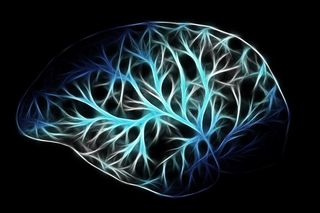Psychology
Is Psychology Really a Science?
Some people say no. Are they right?
Posted October 6, 2017

I remember the first time I heard the words "physics envy." I was attending a lecture by a relatively famous psychologist who was up at the chalkboard explaining a complex theory. He had drawn an intricate network of boxes and arrows all looping back on one another. As he gesticulated toward each part of the diagram, mind-numbing jargon filled the air. After about 15 minutes, he must have been afraid that he was losing his audience, because he stepped back from the blackboard, scratched his chin, and made a joke.
"Sometimes I think psychologists use all this psychobabble because we have physics envy," he said, grinning. Everyone chuckled.
Though he clearly achieved his goal of lightening the mood, I found myself plagued by his curious turn of phrase. I wondered if psychologists might indeed be jealous of their physicist colleagues, whom nobody doubted were real scientists. To make themselves feel better, perhaps psychologists do compensate by using confusing technical terms. His apparently harmless joke seemed to imply that psychology was not a real science.
It's a question as old as the field itself: Is psychology a science or is it better classified as one of the humanities, like philosophy, theology, or literature? I have to admit it’s a bit of a sore spot. As a psychologist, I’ve been poked at more than once by would-be debaters hoping to start an argument. “You don’t really think psychology is a science, do you?” they ask, incredulously.
So let's take a moment to consider a couple of perspectives on what makes something scientific.
One view is that science involves measuring things with great precision. Biologists place cells under powerful microscopes, measuring them to the minutest detail. Astrophysicists measure the rate of expansion of the universe to astounding decimals. And chemists measure precisely what happens to molecules when exposed to heat, cold, or any number of other treatments. Judged from this perspective, psychology clearly falls short. To measure depression, the best we can often do is to use psychological tests that ask people perhaps a few dozens questions about their mood. But this method isn’t foolproof—people can lie or even be self-deceived. As an alternative, we might ask someone to submit to an fMRI or similar brain scan. But this is hardly a direct way of measuring depression. In order to know how the splotches of brain activity that appear on the screen translate into lived experience, we still need to ask the person. Like sociology, economics, and other social sciences, psychology necessarily relies on indirect measurements. But all of these fields are nonetheless known as sciences, even if we do put the word "social" in front of them. So accuracy of measurement may not be the best criterion by which to judge what is and what is not a science.
Perhaps the clearest definition of a “science” is any endeavor that uses the scientific method. Like all scientists, psychology researchers form hypotheses, devise experiments to gather data, and carefully analyze the results. Psychology journals are filled with such studies. Judged from this perspective, psychology is clearly a science. Though not every study is equally well done, of course, psychology investigators are increasingly held to higher and higher standards of evidence.
So why do people persist in questioning the field’s scientific chops?
The problem is that much of what is written about psychology in the popular press isn’t based on the science. Everyone seems to have an opinion about the way the human mind works, leading to a cacophony of conflicting ideas. Self-help books, podcasts, and web pages often propound notions that either have never been scientifically tested or have been tested without success. Though the academic field represented by most professional journals is overtly scientific, the ideas that make their way into public consciousness often are only tenuously related to that field. We psychologists deserve some of the blame for this. Sometimes out of laziness or honest mistakes, at least some psychologists prefer to communicate from the standpoint of personal experience, rather than to base what they teach on scientific findings.
Good science involves an attitude of skepticism, particularly about what we think we know from personal experience. Consider the commonly held belief that opposites attract, a so-called “fact” that I’ve seen many psychologists endorse. Though it may seem intuitively obvious that people with widely differing personalities and values would make good romantic partners, research generally shows just the opposite. In fact, the longest lasting relationships tend to be characterized by deep similarities. Every year, I mention this tidbit to students in one of my university courses. Invariably, whenever I share a counterintuitive finding like this one, someone raise his or her hand and says, “My partner and I are opposites, and we get along great. That proves the research is wrong!” But one person’s experience doesn’t prove or disprove anything. That’s because psychological science isn’t based on a single individual’s experience, but rather concerns what is true the majority of the time for the majority of people. There will always be exceptions to every rule. Though these exceptions are important to understand because every person matters, science is most concerned with figuring out what the general rules are first. So we should be very careful not to regard scientific findings as untrue just because they don't fit with what we think we already know from anecdotal experience.
So, is psychology a science? Yes, particularly if we base our judgment on the research that appears in scientific journals. But most people in the general public don’t read scientific journals. Instead, that research is often filtered through teachers in their classrooms, therapists in their clinics, self-help writers at their keyboards, podcasters at their microphones, and even what we tell one another. What happens to scientific findings after they leave the lab can be at least as important in influencing the public as the findings themselves.
We all share in that responsibility.
David B. Feldman is a Professor of Counseling Psychology at Santa Clara University. Listen to his podcast, “Psychology in 10 Minutes,” on any podcast app, through SoundCloud, iTunes, or by subscribing to the show’s RSS feed.


